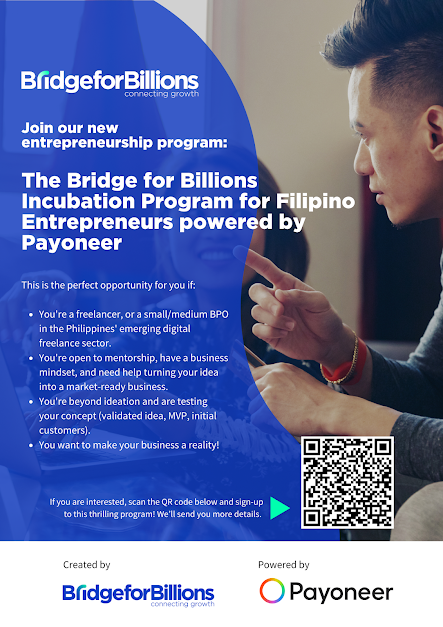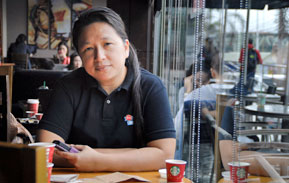I am thankful for the opportunity to mentor and coach micro and small businesses that have joined the Kapatid Mentor-Me Program (KMME Go Negosyo) in developing their business improvement plans. As this program is typically government-supervised, the commitment of entrepreneurs to complete it is truly inspiring.
A common challenge I encounter in informal mentorships is the tendency for either party to start missing meetings, leading to a decline in interaction.
Payoneer, in collaboration with Bridge for Billions, has created an incubation program designed to help entrepreneurs thrive and unlock their full potential as business owners. This program is part of Payoneer's commitment to empowering aspiring small and medium-sized businesses (SMBs) in the Philippines. It aims to support 70 Filipino entrepreneurs nationwide, who will also receive guidance from 70 mentors.
Payoneer is seeking independent gig workers, freelance agencies, and small to medium-sized outsourcing firms operating in any sector of the emerging digital global economy in the Philippines to participate. Nagesh Nevata, SVP for APAC at Payoneer, said, “We are uniquely positioned as we support and empower SMBs, including freelancing agencies. This includes opportunities to find new business, access tools, and scale the business in cross-border markets.”
Ideal entrepreneurs should be past the ideation stage, starting to test their business concept or have a minimum viable product they wish to develop.
The entrepreneurship program will provide participating entrepreneurs with the solid foundation needed to grow their businesses. Online incubation tools include a value proposition, competition map, stakeholder map, business model, marketing, pricing, business viability, financial projections, impact plan, and growth plan, among others. Participants are required to complete a toolkit assigned week by week.
They will be matched with an expert in their field for one-on-one mentorship to help nurture their ideas and progress. Entrepreneurs are responsible for leading the relationship with their mentor, identifying their needs, challenges, and demands for support, rather than waiting for the mentor to provide all the solutions.
Businesses will also be introduced to a dynamic community of co-participants and other mentors. After four months, they will refine their pitch skills to succeed post-program.
Bridge for Billions' innovation-based entrepreneurship was inspired by the Massachusetts Institute of Technology’s Disciplined Entrepreneurship Concept. Over the past 8 years, the program has conducted 270 incubation programs in 134 countries. It has matched 3,709 entrepreneurs with 3,029 mentors. Of these entrepreneurs, 94% rated the program as important to their success, with many seeing their revenues increase by up to 2.4 times.
Experts and professionals are also invited to become mentors. They should have at least 5 years of professional experience in fields such as business, finance, and innovation, among others. Ideal mentors are those passionate about entrepreneurship, eager to develop their mentoring skills, and looking to have a tangible impact on job creation and the economic development of the country.
Mentors are expected to provide feedback on the entrepreneur’s submissions to the toolkit and commit to weekly meetings to offer challenges and guidance.
What’s in it for the mentors? As advisors, they can create a network of early-stage innovators for potential future collaboration. Joining the program also exposes them to emerging innovation trends in their industry and positions their brand within the global innovation and entrepreneurship ecosystem.
Additionally, mentoring promotes diversity, equity, and inclusion, especially for typically underrepresented groups. As mentors, they can help create jobs, foster economic prosperity and innovation, and build impactful solutions for industry-wide challenges.
“Payoneer recognizes the scarcity of incubation support for SMBs, which is why we wholeheartedly encourage them to join the Bridge for Billions Incubation program. This program is a testament to our dedication to fostering innovation and empowering Filipino entrepreneurs to scale up and achieve global success,” says Monique Avila, Payoneer’s senior director for customer success in APAC.
Join the Bridge for Billions Incubation Program today. Entrepreneurs can sign up at https://programs.bridgeforbillions.org/payoneer-for-entrepreneurs/. Mentors can join at https://programs.bridgeforbillions.org/payoneer-for-mentors/. Applications will be accepted until December 2023. Selected entrepreneurs and mentors will be announced in February 2024. The incubation program will run from March to June 2024.
The program will also feature a pitch competition in June 2024, where three winners will receive US$2500, $1500, and $1000, respectively. Details about the pitch competition will be disclosed to participants.
John Caplan, CEO of Payoneer, said, “It is our mission to help entrepreneurs in every small way we can.” Bridge for Billions CEO Pablo Santaufemia believes that change cannot be achieved by one actor alone. “Collaboration is necessary as together we can learn and bring our expertise to the table.”
Digital industries such as information technology and business process management (IT-BPM) and freelancing continue to transform the economic landscape of the Philippines. The IT-BPM industry closed in 2022 with revenues of $32.5 billion and employed 1.57 million people. In 2020, freelance revenues saw a 208% increase from 1.5 million gig workers.
I hope a lot of entrepreneurs and mentors will join this program.










